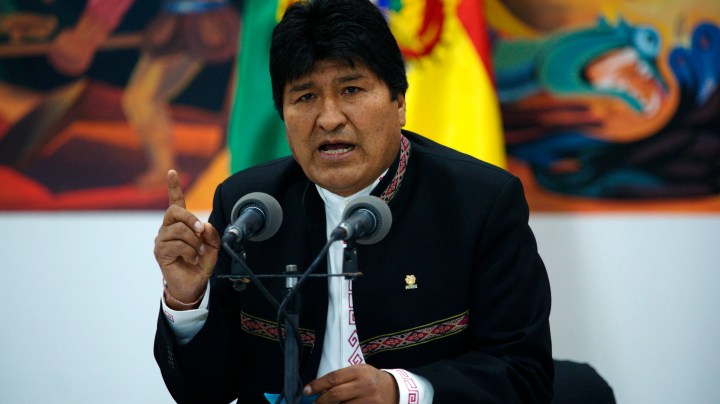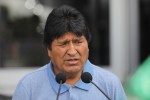Bolivian President Evo Morales Steps Downs, Says He’s the Victim of a Coup

President of Bolivia and Presidential candidate for MAS Evo Morales speaks during a press conference on October 23, 2019 in La Paz, Bolivia. Photo by Javier Mamani/Getty Images
After weeks of protests in Bolivia, President Evo Morales stepped down on Sunday.
The South American leader came under fire last month when demonstrators accused him of manipulating votes during the October 20 presidential election. While Morales, Bolivia’s longest-serving president, denied any wrongdoing and declared himself the winner, a report from the Organization of American States (OAS) over the weekend found “serious irregularities” concerning the vote count.
Morales responded to the report by guaranteeing to hold another election; however, hours later he gave a nationally televised address that he was resigning, citing that is was “good for the country.”
“I want to tell you, brothers and sisters, that the fight does not end here,” Morales, 60, said, as reported by Al Jazeera. “We will continue this fight for equality, for peace.”

The former president, who has led the country since 2006, said he was the victim of a “coup.”
Earlier, Army Chief Gen Williams Kaliman told Morales to resign “to allow for pacification and the maintaining of stability,” adding that he would organize groups to “neutralize” attacks. Morales has said his house in Cochabamba, in central Bolivia, was attacked by violent groups and that his supporters were experiencing similar forms of brutality. He also accused law enforcement of issuing an “illegal” warrant for his arrest, a claim that police have denied.
In his video address, Morales, the country’s first-ever Indigenous president, asked for the people to “stop attacking the brothers and sisters, stop burning and attacking.”

Fellow Latin American leaders, including Cuban President Miguel Díaz-Canel and Venezuelan President Nicolás Maduro, agreed that Morales is the victim of a coup.
“We categorically condemn the coup realized against our brother president,” Maduro tweeted.
There remains uncertainty as to who will lead the nation now that Morales has left the top spot. Many of the members who were next in the presidential line of succession also stepped down on Sunday. The second vice president of Bolivia’s senate, Jeanine Añez, has claimed to be next up for the position and has stated that she is ready to assume the role. Upon doing so, she said she would also hold new elections.

There have also been calls for Carlos Mesa, who came in second in last month’s election and is a former president of the country, to take the lead alongside opposition leader Luis Fernando Camacho in the interim in order to “pacify” Bolivia.